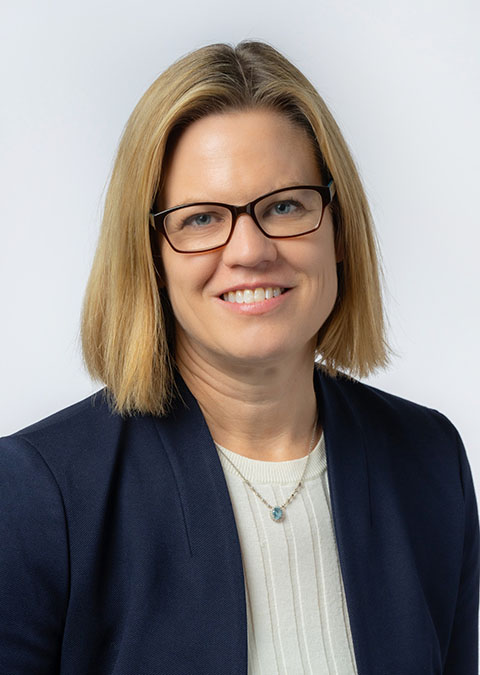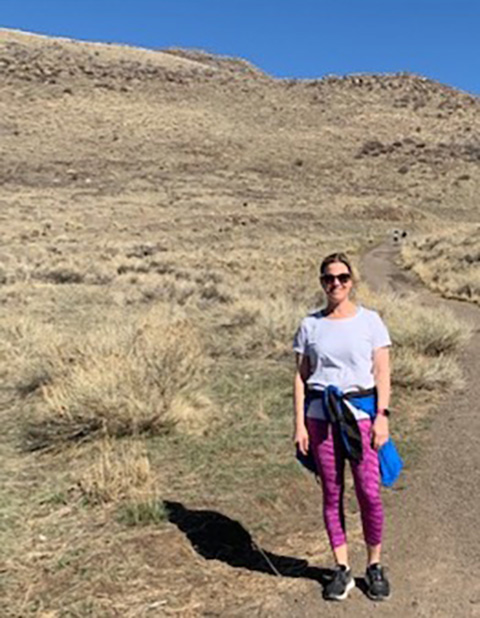Meet the Researcher: Katherine Hurst, Hydrogen
Katherine Hurst Dedicates Her Career To Investigating How To Make Hydrogen More Affordable and Accessible To Use Across Multiple Energy Sectors
Today, you might see a highly successful chemical engineer leading some of the National Renewable Energy Laboratory's (NREL's) largest hydrogen projects, but Katherine Hurst started in one of the most unexpected places: liberal arts.

"I started my undergraduate career not knowing what I wanted," Katherine (Katie) Hurst recalled. "But I started to enjoy science because there was tangible progress and a path forward to getting things done, finding new things."
After Hurst switched her degree to natural science, the coursework clicked with her. It was not long until she knew that she wanted to pursue graduate school, and she attended the Colorado School of Mines for her master's degree in chemical engineering with a heavy emphasis in mathematics. During her graduate studies, she worked with NASA separating gases using membranes.
"It was my first exposure to thinking about materials and gases," Hurst remarked. "What controls what materials are made of; how do they interact at the molecular level? These phenomena are all around us. I love working with gases and membranes still, and it's so useful to my work today."
She did not always know that it would be, though. The jobs that were around when Hurst graduated did not align with her research interests.
"But then I found NREL," she said. "I went to apply, and it turned out that they were only accepting students at the time—so I went back to school."
Hurst went on to complete her doctorate in chemical engineering while doing her thesis research at NREL in the hydrogen storage materials group. After graduating, however, she did not go straight back to NREL full time.
"After graduating, I did a postdoc with NIST (the National Institute of Standards and Technology) in Boulder working with physicists," Hurst said. "It was fun using my materials background in a different context, applying carbon nanotubes as optical detectors, among other things."
She became a full-time research associate for NIST after her postdoctoral appointment, but ultimately, she was inspired to return to NREL after running into her NREL mentor again.
"I've been back ever since," Hurst laughed. "And I'm so glad that I did. This is an incredibly exciting time for hydrogen—when this research was just beginning 20 years ago, it was just a 'science thing'—and now we are seeing a transition to hydrogen fuel for large ships and heavy-duty trucks. It's amazing to think that we've come this far and fun to see the industry come around."

One of the collaborations that she leads is with GKN Hydrogen and Southern California Gas Co. (SoCalGas). The multiyear project, funded in part by the U.S. Department of Energy's Hydrogen and Fuel Cell Technologies Office, is creating a metal-hydride-based hydrogen storage system integrated with NREL's Advanced Research on Integrated Energy Systems (ARIES) megawatt-scale hydrogen capabilities. Hurst is also the principal investigator for an Energy Frontier Research Center project in partnership with the University of California, Irvine that studies photoelectrochemical nanoreactors.
"I was primarily a scientist for a long time," she reflected. "I decided that I also wanted to be a manager to support people in their careers. This field can be difficult to work in, and I wanted to help change a culture that sometimes emphasizes individual accomplishment too much. There are many valuable roles in science, and everyone has their own goals."
From continuing her research at the molecular level to leading large-scale research on hydrogen infrastructure, Hurst's range and expertise are not just sought after by her team members and mentees. She has presented to legislators and international experts and even served as a subject matter expert for NREL's facilities management.
"Perseverance and patience were key for me throughout my career," Hurst shared. "I had to learn that some things wouldn't happen as fast as I wanted them to. But I feel like I've ended up in a really good place."
Learn more about energy storage research and careers at NREL.

